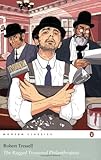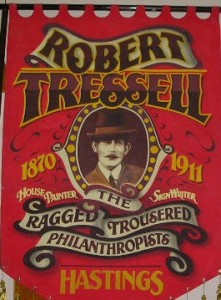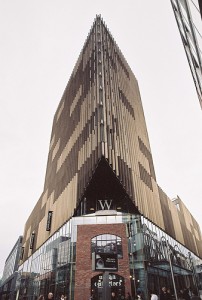Liverpool’s Radicals
The theme for 2011 in Liverpool could be said to be a celebration of the city’s heroes. This centres around the anniversary of the death of Robert Tressel, author of the Ragged Trousered Philanthropists. This ‘socialist novel’ has been described as ‘seminal’, and sought to publicise the author’s criticisms of the greed of capitalism. It was also possibly the first novel about the class war.
Liverpool has a long and proud tradition of philanthropy (and class war…), which are still in evidence today, so although Tressel (born Noonan) had only a fleeting relationship with the city (he died here on his way to Canada in 1911) there is certainly a lot to talk about in this year of Liverpool City of Radicals.
In a couple of future posts I’m going to talk about the radicals, philanthropists and pioneers who have shaped Merseyside’s landscape (in quite broad terms!), but it’s worth starting off with a little round-up of the recent and future events celebrating Liverpool’s influential sons and daughters of all types.
Ragged Trousered Philanthropist
Robert Tressell, who died at the Royal Infirmary and was buried in Walton Cemetery, will be celebrated across February in the city.
A memorial service for the author took place on 3rd February, including a recreation of his funeral. Then, readings from his most famous novel will happen on various days until 15th February.
See the Liverpool City Council Robert Tressell Celebration page for three radical events which happened in 1911, and the plans for this year’s commemorations.
Liverpool Discovers
One thing Liverpool is doing more and more prominently each year is art, and so Liverpool Discovers will be one of the best ways to find out about the great discoveries and inventions which can call Liverpool ‘home’.
Liverpool, the Wirral and St Helens will be the venue for a trail of art installations celebrating the lives of Liverpool’s greats, from Stephenson and his Rocket and Jeremiah Horrocks to suffragette Mary Bamber and Ronald Ross, who discovered malaria’s mode of transmission in the world’s first school of tropical medicine.
There’s now a map for you to download and follow to take in all these artworks, so get your walking shoes on and hit the streets (from 14th February!).
Set in Stone
Slightly less Liverpool-centric, and with a questionable level of focus, is a project which is part of the Central Library redevelopment.
Liverpool City Council wants you to have your say in the selection of works to adorn a ‘Literary Pavement’ leading up to the entrance. Titles from books, cinema and music have been nominated, meaning Sgt Pepper’s Lonely Heart’s Club Band sits next to The Very Hungry Caterpillar.
As I mentioned, this is less Liverpool-centric, but another element of the project is to have a ‘Literary Liverpool’ display on the rear of the building. This gives all its space to Scousers, including Beryl Bainbridge, the late Brian Jacques, and Robert Tressell himself (ok, so we seem to have fully adopted him as an honorary Scouser).
Your role is to vote for who lands on the Pavement and who sticks to the Wall, so go and vote!
Recommended Reading
 I must admit I was only vaguely aware of The Ragged Trousered Philanthropists before late last year, and had no idea of the Liverpool connection. So I’ve bought the book, and will let you know my thoughts on it if it’s relevant to this blog. I’m certainly looking forward to picking it up, and if you want to buy a copy while supporting this blog, just click on the book cover to the left. If you buy a copy after using that link (even if you choose another edition!) then a small slice of the profits will go into helping this blog break even.
I must admit I was only vaguely aware of The Ragged Trousered Philanthropists before late last year, and had no idea of the Liverpool connection. So I’ve bought the book, and will let you know my thoughts on it if it’s relevant to this blog. I’m certainly looking forward to picking it up, and if you want to buy a copy while supporting this blog, just click on the book cover to the left. If you buy a copy after using that link (even if you choose another edition!) then a small slice of the profits will go into helping this blog break even.
If you do read it (or already have done!) let me know your thoughts! What have philanthropists ever done for Liverpool? Were their gifts to the city just guilt for their own wealthy status (often earned on the backs of the working class)? Or were they truly trying to change Liverpool for the better? Perhaps it was both.
Next time I’ll explore a couple of people who’ve had a ‘radical’ effect on the city. Who should I include?






